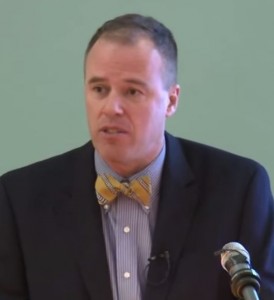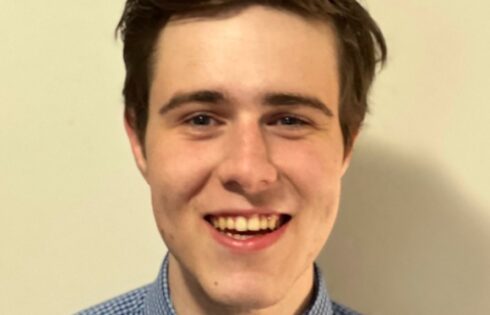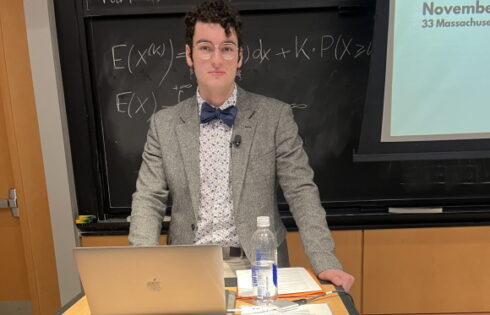
Even center-left professors ‘have never been so fearful’
NEW YORK – Tenured faculty need to start speaking out against the growing climate of campus censorship, or the next generation of professors may not have the job security to do so, the author of a new paper told an event Wednesday hosted by the religion and public life journal First Things.
Jay Schalin of the Pope Center for Higher Education Policy presented “Academic Freedom in the Age of Political Correctness,” which argues that many in academia take academic freedom for granted even as speech codes and anti-speech identity politics proliferate.
In opening the event, Emory University English Prof. Mark Bauerlein said even his “center-left and moderate” colleagues on campus “have never been so fearful” of speaking their minds on social issues, for fear of retaliation from higher-ups. Bauerlein is a senior editor at First Things.
Just months ago, according to Schalin, the provost at the University of North Carolina-Chapel Hill said during a debate on academic freedom there, “Why are we even debating this? Doesn’t everyone want academic freedom?”
MORE: Professor requires students write 8-page ‘commitment to social justice’
This shows that the concept of academic freedom is practically innate, Schalin said, but his research has shown that many academic institutions treat the dominant leftist ideology like binding “regulations,” and they have allowed “intrusive speech codes” to become the norm, in the name of diversity. The right to not be offended is “an absurd claim,” he said.
It may be up to state governments to rein in public universities following scandals involving rape accusations and shadow classes for student athletes, Schalin said, without expressing optimism for private schools either.
Blocking tenure to keep professors quiet
Schalin worries that the “tyranny of the majority” is enabling primarily leftist forces to silence naysayers and dominate the campus political climate.
Only tenured veterans can safely speak out against this pattern, because their equally qualified younger colleagues are being denied tenure for purely ideological reasons, he said.
The Pope Center's Jay Schalin gives his take on #AcademicFreedom.
Check it out!https://t.co/sRCy1ShsoI— The Martin Center (@AcademicRenewal) October 6, 2016
Entire academic fields, particularly in the social sciences, are moving toward teaching mere hypotheses “as fact” in the classroom, Schalin said – molding young minds into accepting one unquestioned worldview. The activism of identity politics is supplanting the “pursuit of truth” that universities should cultivate, he said.
MORE: Adjunct demand for $15,000 per course could backfire
At the same time, academics should not put their hope in “professional standards” to protect academic freedom, because vested interests can hold sway through funding, Schalin said, citing the American Association of University Professors.
He prefers that academic debates be treated like a “court system,” in which two contrary cases are presented and a third party determines which has more academic merit.
Authority wrongly equated with truth
National Association of Scholars President Peter Wood pointed to another cause of political correctness overtaking academic freedom: the surrounding cultural climate in which authority is seen as synonymous with truth.
It will take “another cultural shift” to undo a shift “of this magnitude,” through the means of “civil discourse,” and it won’t happen “on schedule,” Wood said.
 Brooklyn College History Prof. KC Johnson, co-author of a book on the Duke University lacrosse rape case, blamed “protest culture” and the “vague criteria” in new regulations that are flippantly imposed by administrators in response.
Brooklyn College History Prof. KC Johnson, co-author of a book on the Duke University lacrosse rape case, blamed “protest culture” and the “vague criteria” in new regulations that are flippantly imposed by administrators in response.
Johnson said the “redefinition of Title IX” aims to “eviscerate the due process rights of students” who are accused of rape or other unsavory actions that present public-relations headaches for colleges.
It was clear from the tone of the panel, and the tenor of Schalin’s paper itself, that political correctness is a deep-rooted problem on modern campuses, that the climate of fear to speak freely affects both students and faculty – and that there’s no timetable for when it will get better.
MORE: Mohammed cartoon editor disinvited for sake of ‘academic freedom’
MORE: Title IX enforcement violates academic freedom
Like The College Fix on Facebook / Follow us on Twitter
IMAGE: pathdoc/Shutterstock





Please join the conversation about our stories on Facebook, Twitter, Instagram, Reddit, MeWe, Rumble, Gab, Minds and Gettr.